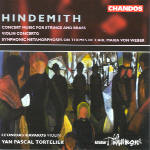Yan Pascal Tortelier’s Hindemith cycle hits a bit of a snag with this release, which, while good, does not rise to the level of its predecessors. Part of the problem, not surprisingly, stems from the excellence of the competition. In the Concert Music we have outstanding recordings by Bernstein (twice, on Sony and DG), Blomstedt (Decca), Steinberg (DG), and closer to home, Behlohlávek with the Czech Philharmonic on this very label. Tortelier conducts well and the BBC Philharmonic sounds thoroughly professional, but the recording balances the brass too closely, horns in particular, with especially annoying results in the “oompah” accompaniment to the strings’ lyrical theme in Part 2.
The Symphonic Metamorphoses on Themes by Weber similarly enjoys many fine performances, including Bernstein (again twice), Szell (Sony), Ormandy (EMI), Levi (Telarc), Kubelik (Mercury Living Presence), and Abbado/LSO (Decca, not his DG remake from Berlin). This newcomer sports very fast tempos in the second and fourth movements, too fast in all fairness. Listen to how the “Turandot” theme in the scherzo lacks articulation and fails to penetrate the dense accompaniment as its initial repetitions pile up. And how could anyone really march to the finale at this speed? It needs sharper, clearer rhythms, a more tightly focused recording, and room for the climaxes (especially the layered brass build-up in the final bars) to expand. It’s certainly not bad, but you can do much better.
The Violin Concerto features the very talented Leonidas Kavakos, who plays with great confidence, ample virtuosity, and a sweet, pure timbre. He’s also very well balanced against the large orchestra. But what competition he faces! There’s Oistrakh/Hindemith on Decca (recently reissued on Eloquence with the Abbado Symphonic Metamorphoses mentioned above), and best of all, Bernstein/Stern (Sony), who combine to make the central slow movement one of the great Romantic (or neo-Romantic) utterances for violin and orchestra. Significantly, they take three minutes longer than Kavakos and Tortelier, and even the composer gives Oistrakh a full minute more to luxuriate in this lovely music. So there you have it: decent performances that simply aren’t competitive with the best, decently but not exceptionally captured by the engineers. It’s your call.
































